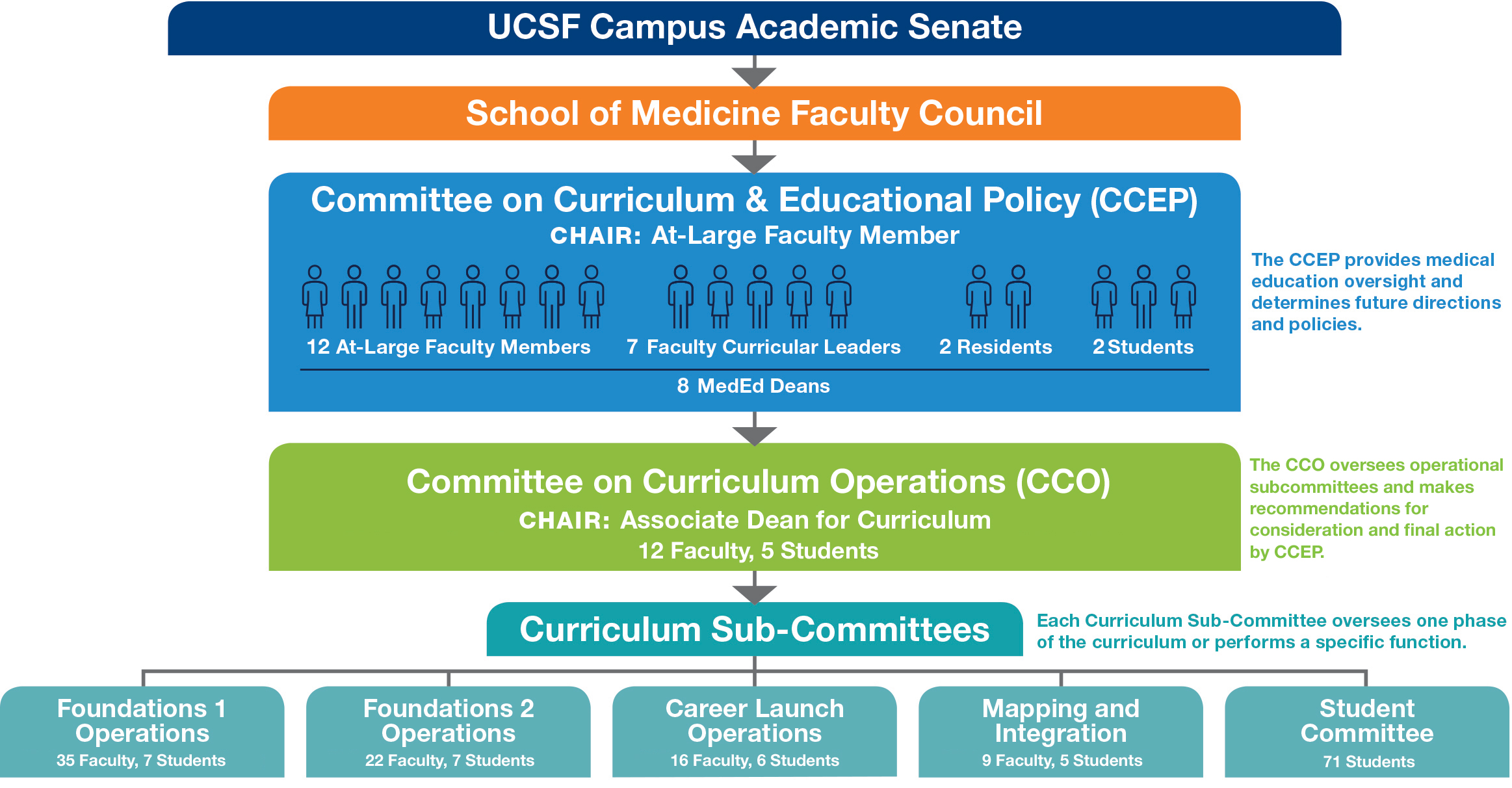Committee on Curriculum Operations Charge
Updated 12/2025
Introduction
Since its inception in 2016, the Bridges Curriculum has provided integrated and dynamic medical education to train future physicians who will improve health and reduce suffering for patients and populations. In 2016, the Executive Committee was charged with overseeing the work of its sub-committees and reporting to the Committee on Curriculum and Educational Policy (CCEP). To clarify and streamline governance work in the Bridges Curriculum, the Executive Committee is being reenvisioned and renamed as the Committee on Curriculum Operations (CCO).
Committee Charge
This Committee on Curriculum Operations (CCO) is a subcommittee of the Committee on Curriculum and Educational Policy (CCEP) and is charged by the CCEP to oversee the work of the Curriculum Subcommittees (see figure). The CCO will make recommendations for consideration and final action by the CCEP. The CCO will issue charges to, and act upon, recommendations from its Curriculum Subcommittees. Matters relating to policy or changes to curricula at or above the element, course, clerkship, program, or parallel track level must be discussed and approved by CCEP.
The Curriculum Subcommittees that report to the CCO include Foundations 1 Operations, Foundations 2 Operations, Career Launch Operations, Mapping and Integration, and the Student Committee (refer to the diagram below).

The specific responsibilities of the CCO, as charged by the CCEP, are to:
- Help to ensure that the School of Medicine is operationally compliant with LCME educational standards;
- Review and propose revisions to educational policies to the CCEP;
- Review and monitor data related to curriculum content quality, consistency, and distribution across all curricular courses, clerkships, and programs and provide recommended changes to CCEP;
- Review proposed curricular innovations and change and provide recommendations before discussing at CCEP;
- Promote horizontal and vertical integration amongst all curricular components;
- Facilitate effective communication across governance subcommittees and broader stakeholders to ensure transparency and broader awareness of curriculum-related decisions and changes.
The specific LCME standards that the Committee on Curriculum Operations is responsible for are:
Standard 6.1: Program and Learning Objectives
Standard 8.2: Use of Program Objectives
Standard 8.3 a,b: Curricular Design, Review, Revision, Content Monitoring
Standard 8.7: Comparability of Education/Student Assessment
Standard 8.8: Monitoring Student Workload
Standard 9.4: Student Assessment
Standard 9.7: Formative Feedback
Standard 9.8: Fair and Timely Summative Assessment
Membership:
Membership (voting members designated in bold font):
-
Associate Dean for Curriculum (chair)
-
Director of Foundations 1
-
Chair Foundations 1
-
Director of Foundations 2 and Career Launch
-
Chair Foundations 2
-
Chair Career Launch
-
Director of Assessment and AI in Medical Education
-
Director of Anti-Oppression Curriculum Initiative
-
Director SJV PRIME (Fresno)
-
Associate Director, JMP and Administrative Director, JMP-PRIME-US (UC Berkeley)
-
Associate Director, PRIME-US
-
Medical Education Manager, SJV PRIME+ (UC Merced)
-
ACE Executive Director
-
Students: SMEC co-chairs
-
Manager, Educational Evaluation and Educational Continuous Quality Improvement
-
As needed guest attendees, for example, Student Experience Team, faculty development, Education Evaluations, longitudinal curricular elements
Meetings:
The Committee on Curriculum Operations will meet every 2 months. The Associate Dean for Curriculum will provide reports to the CCEP as needed.
